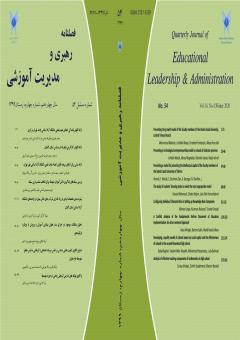شناسایی مؤلفه های مدل آموزش و توسعه حرفهای معلمان
الموضوعات :قاسم بامیری 1 , محسن دیبایی صابر 2 , سیف اله فضل الهی 3
1 - دانشجوی دکتری گروه مدیریت آموزشی، واحد قم، دانشگاه آزاد اسلامی، قم، ایران.
2 - دانشیار گروه علوم تربیتی، دانشگاه شاهد، تهران، ایران.
3 - استادیار گروه علوم تربیتی، واحد قم، دانشگاه آزاد اسلامی، قم، ایران
الکلمات المفتاحية: آموزش, توسعه حرفهای معلمان, رویکرد کارآفرینانه.,
ملخص المقالة :
هدف: هدف پژوهش حاضر شناسایی مؤلفه های مدل آموزش و توسعه حرفهای معلمان بر اساس رویکرد کارآفرینانه بود.
روش: روش پژوهش رویکرد آمیخته اکتشافی بود. در روش آمیخته در دو فاز کیفی و کمی که در بخش کیفی از روش تحلیل مضمون و در بخش کمی از تحلیل توصیفی از نوع پیمایشی استفاده شد. جامعه آماری شامل کلیه اساتید دانشگاه فرهنگیان، دولتی، آزاد اسلامی و معلمان استان چهارمحال و بختیاری که در بخش کیفی ۱۵نفر مصاحبه در حد اشباع و در بخش کمی ۲۳۰ نفر از به روش نمونه گیری هدفمند انتخاب شدند. ابزار اندازهگيري در بخش کیفی مصاحبه نیمه ساختارمند و در بخش کمی پرسشنامه ۱۲۷سؤالی محقق ساخته بود. جهت تجزيه و تحليل اطلاعات در بخش کمی از نرم افزارSPSS-26 و نرم افزار اسمارت PLS و در بخش کیفی براساس رویکرد گرند تئوری از تحلیل مضمون استفاده شد.
یافته ها: یافتهها نشان داد، شش عنصر برنامه درسی برخاسته از دادههای کیفی شامل: منطق، هدف، محتوا، راهبرد آموزشی، مواد آموزشی، و ارزشیابی بوده است.
نتیجه گیری: پیادهسازی آموزش و توسعه حرفهای معلمان بر اساس رویکرد کارآفرینانه به طور حتم موجب توسعه دانشی معلمان و رشد مهارتهای فردی معلمان میشود و آنان نسبت به پرورش قابلیتها و استعدادهای خود آگاه خواهند شد.
حسینی، فاطمه. علی عسگری، مجید.، قلتاش، عباس.، و احدبیگی، فاطمه. (1401). طراحی و اعتباربخشی مدل برنامه درسی کارآفرینی اجتماعی در آموزش عالی ایران. فصلنامه پژوهش در نظامهای آموزشی، پیاپی ۲۵: 145-174.
داوودی راد، دانیال. عباسپور، عباس، و میگون پوری، محمدرضا. (1400). طراحی و اعتباریابی الگوی کارآفرینی اجتماعی نظام آموزش عالی ایران. فصلنامه پژوهش در نظامهای آموزشی، پیاپی ۵۴: 33-50.
عبداللهی، بیژن. سادین، علی¬اکبر.، نوه¬ابراهیم، عبدالرحیم.، و عباسیان، حسین. (۱۴۰۱). طراحی مدل بالندگی حرفه¬ای اعضاء هیئت علمی در دانشگاه فرهنگیان با رویکرد داده بنیاد و پارادایم آمیخته اکتشافی. مدیریت بر آموزش سازمان¬ها، ۱۱(۳): ۸۳-۴۱.
کشاورزی، فهیمه. جاودانی، محمد.، و بدخشان، مجید. (۱۴۰۰). طراحی چارچوب شایستگی¬های حرفه-ای معلمان کارآفرین. نوآوری¬های آموزشی، 20 (4): ۵۴-۳۵.
کمالی، ندا. سیف نراقی، مریم. و نادری، عزت اله. (۱۳۹۹). طراحی الگوی درس کارآفرینی در دوره کارشناسی آموزش ابتدایی مبتنی بر ویژگیهای ذهنی- روانی کارآفرینان آموزشی. فصلنامه توسعه آموزش جندی شاپور، 11 (2): ۹۰-۷۸.
مرادیان، پریسا. سلیمی، مهتاب. و جهانیان، رمضان. (۱۳۹۹). شناسایی عوامل توسعه کارآفرینی آموزشی در نظام آموزش عالی. فصلنامه علمی آموزش علوم دریایی، 35 (2): ۲۱.
Acton, R. (2019). Mapping the evaluation of problem-oriented pedagogies in higher education: A systematic literature review. Education Sciences, 9(4): 1–15.
Banha, F., Luís, S. C., & Adão, F. (2022). Entrepreneurship Education: A Systematic Literature Review and Identification of an Existing Gap in the Field. Education Sciences, 12: 336.
Bell, R. (2020). Adapting to constructivist approaches to entrepreneurship education in the Chinese classroom. Stud. High. Educ, 45: 1694–1710.
Chyekoh, H. (2019). Testing hypotheses of entrepreneurial characteristics: A study of Hong kong MBA Students. Journal of managerial psychology. 11(3): 12-25.
Cui, J. (2021). The Impact of Entrepreneurship Curriculum with Teaching Models on Sustainable Development of Entrepreneurial Mindset among Higher Education Students in China: The Moderating Role of the Entrepreneurial Climate at the Institution. Sustainability, 13, 7950.
Colombelli, A., Loccisano, M., Panelli, A., Orazio, A. Pennisi, M., & Francesco, S. (2022). Entrepreneurship Education: The Effects of Challenge-Based Learning on the Entrepreneurial Mindset of University Students. Administrative Sciences, 12: 10.
Cui, J. (2021). The Impact of Entrepreneurship Curriculum with Teaching Models on Sustainable Development of Entrepreneurial Mindset among Higher Education Students in China: The Moderating Role of the Entrepreneurial Climate at the Institution. Sustainability, 13: 7950.
Ferreira, J., Fayolle, A., & Ratten, V. (2018). Entrepreneurial universities: Collaboration, education and policies. London: Routledge, ISBN 9781786432452.
Guerrero, M., Urbano, D., & Gajón, E. (2020). Entrepreneurial university ecosystems and graduates’ career patterns: Do entrepreneurship education programmes and university business incubators matter? Journal of Management Development, 39(5): 753–775.
Heliona, M., & Cungu, J. (2023). Entrepreneurship Education, a Challenging Learning Process towards Entrepreneurial Competence in Education. Administrative Sciences, 13: 22.
Hero, L. M. (2018). Innovation tournament as a multidisciplinary activity system to promote the development of innovation competence. Ammattikasvatuksen aikakauskirja, 19(4): 8-31.
Jeou-Shyan, H., Han-Liang, H., Horng, H.L. Hsiao, C.H. Liu, S.F. & Chou, K. (2021). Learning innovative entrepreneurship: Developing an influential curriculum for undergraduate hospitality students. Journal of Hospitality ,29: 1132.
Jerez Yàñez, Ó., Aranda Càceres, R, Corvalán Canessa, F., González Rojas, L., & Ramos Torres, A. (2019). A teaching accompaniment and development model: Possibilities and challenges for teaching and learning centers. International Journal Acad. Dev. 24: 204–208.
Kim, S., Raza, M., Seidman, E. (2019). Improving 21-st century teaching skills: The key to effective 21-century learners. Research in Comparative and International Education, 14(1): 99-117.
Mei, W. & Symaco, L. (2020). University-wide entrepreneurship education in China’s higher education institutions: Issues and challenges. Stud. High. Educ,4: 1–17.
Shahin, M. (2021). The impact of a STEM-based entrepreneurship program on theentrepreneurial intention of secondary school female students. International Entrepreneurship and Management Journal, 32 (4): 435.
UNESCO. (2015). Transforming technical and vocational education and training: building skills for work and life [Paper presentation]. Third International Congress on Technical and Vocational Education and Training, Shanghai, China.
Wu, W., Wang, H., & Wu, Y. J. (2020). Internal and external networks, and incubatees’ performance in dynamicenvironments: entrepreneurial learning’s mediating effect. The Journal of Technology Transfer, 46(6): 1707-1733.
Yuan, C. H., & Wu, Y. J. (2020). Mobile instant messaging or face-to-face? Group interactions in cooperative simulations. Computers in Human Behavior, 113, 106508.


